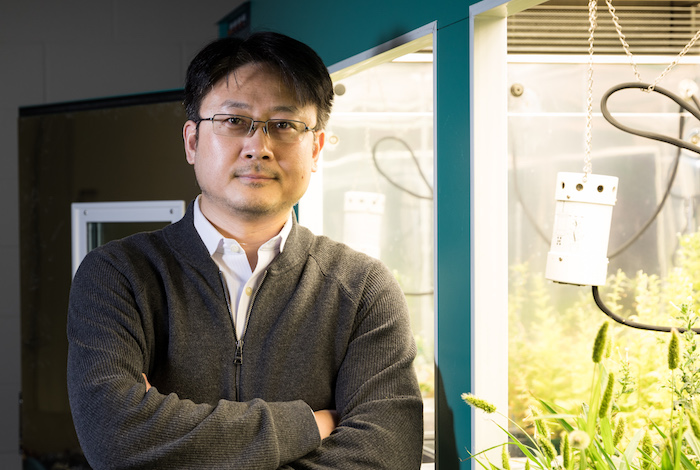New faculty member Feng Zhang envisions genome editing on a large scale in plants with an eye to healthier, more resilient crops.

When he was a postdoctoral researcher, Feng Zhang helped make a game-changing discovery. He and Dan Voytas invented the TALEN system—a genome-editing tool that allowed scientists to more precisely and effectively target and change specific DNA sequences.
“We thought, ‘there has to be a better tool out there,’” Zhang recalls. “We were excited about the opportunity and potential to build the next-generation of genome-editing technology.”
Now, about 10 years later, Zhang has returned to the college to continue his research as a member of the Plant and Microbial Biology faculty. In addition to conducting its own research, Zhang will collaborate with Voytas and several other labs to advance plant genome-editing technologies as part of the recently launched Center for Precision Plant Genomics.
Zhang’s interest in genetics surfaced early. He was always talented at math and biology, and genetics was a way to blend those two passions into one pursuit. After obtaining his bachelor’s and master’s degrees in genetics from Nankai University in Tianjin, China, Zhang came to the United States and earned his Ph.D. at Iowa State University. He did postdoctoral work for the University of Georgia before coming to the University of Minnesota in 2008.
With the TALEN technology in hand, Zhang and Voytas co-founded a University-launched startup company called Calyxt in 2010 that aimed to develop healthier and more resilient crops. As their first project demonstrating the technology’s potential, Zhang and Voytas set out to address a problem with soybeans. Soybean oil is a common ingredient in foods, but it often needs to be hydrogenated before use—a process that creates trans fats, which are linked to health issues like heart disease. The two researchers successfully used gene editing to develop a soybean with healthier fatty acids, more similar to olive oil, removing the need for hydrogenation and the creation of trans fats.
But now, after working at Calyxt for seven years, Zhang is excited to be back conducting research at the College of Biological Sciences.
“It feels great,” he says. “I always love to go back to academia.”
As he turns his focus to the road ahead, Zhang says he’s motivated by the role plants will play not just in sustainably feeding a growing global population, but also in providing the fibers, fuels, and pharmaceuticals that society relies on.
And while genome-editing tools have advanced, Zhang says there are opportunities for improvement. He likens these tools to word processors—they let scientists change or delete a few specific letters in a book’s worth of DNA “text.” Hitting the “delete” key has become easy, but replacing one letter with another letter—that is, changing a base pair in the DNA—is much trickier.
“I’m thinking about the future,” Zhang says. “I really want to be able to push the technology to enable genome editing on a large scale and eventually create designed genomes in plants.” -Kevin Coss